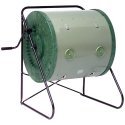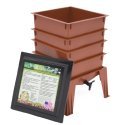Low-Tech Composting on Community Levels in Impoverished Nations
Can composting in a poor low-tech community or nation bring a greater concept of wealth and well-being than a good economy? Does composting have such value?
When people think about gross domestic product that supposedly shows how wealthy a given nation is or is not, the poor of any given nation look at those numbers like they were lies, and with good reason, they dont see any of that wealth in their own lives.
But one thing people in low-tech impoverished communities usually dont have access to, is a good and decent education. And in the end, the GDP only determines the final services and products in a country in any given time, not a nations well-being.
Well-being is what is most important, not the current situation of the economy. GDP is not a calculation of real wealth; well-being is a real calculation of wealth. Human happiness.
Composting in an impoverished low-tech community can be one of the most important factors in creating that kind of well-being. But why? Why would they care? The media makes it a point to merchandise fast cars and new clothes.
And even worse, most of these communities walk around living in a kind of urban landfill, dumping trash and human fecal material all in the river behind the house just to find that it all clogs up and floods in heavy rains.
Romans sacrificed rivers to send their number one and two into the sea, but that was 1,500 years ago, do things need to still be done in this way, just to be low-tech? Why not compost and recycle? Those are products that can actually generate monetary revenue! And better yet, do-it-yourself projects create well-being!
Recycling number one and number two is easy, and just about as low-tech as one could possibly get. Its safe, AND a feasible way to purify human organic by-products. By never throwing waste in the water, we never contaminate it.
By cultivating our ugly human organic by-products into clean earthy smelling humus, we create garden materials that could be either sold or used in community agriculture.
Human organic by-products are high in nitrogen, and as long as there is a high concentration of easily composted carbon materials at hand (like sawdust, paper and moss) composting it into a community based project can be simple, safe and clean.
Not just clean for the environment, clean for ourselves, our children and our childrens children down the line. Composting is natures way to do good for itself and us, providing forests to breath air, food to eat and ground to walk on, all of it filled with life!
Composting is a way to commune with the planet. Not just spiritually, but also scientifically, logically, historically and statistically, as one wishes to think of it.
The obvious is that by composting on individual, community, national or even global scales, we work with nature. If we work with nature, nature will work back with us, providing eternally, it is simple and obvious.
But who will invest? Who is interested in helping the poorinvest in their own wastes? Perhaps only those people living near or around the poor neighborhoods and find themselves most victim to the naughtious smells and toxic floods. Those people who find their well-being greatly disturbed, independent of theircurrent financial situation.
How much would it cost to actually do the marketing with posters and flyers until those people start to wake up? How many lectures on community consciousness would need to occur? How many people would go if soup was being served? How much would it cost to find a space for all that compost?
How much would it cost to get people to invest with their own wastes? How many compost toilets and kitchen scrap bins would need to be made? How about finally getting that compost to the market? Would it market? If so, for how much?
If community agriculture was taught, how long would it take for people to do it themselves? How about getting their final agricultural products to market? Would it market, if so how much?
Well, if people are given the resources, they can figure it out for themselves, and education about composting is a valuable resource indeed. Especially to those who go without. Pride in ones own achievements is an outcome to composting that creates the kind of well-being that money cant buy. Compost itself and even some personal low-tech home gardening, can actually generate wealth.
So who has the passion to do it? This is the final question. Is anyone willing to fight and die for life giving humus in a community that needs it? One day perhaps, that diamond in the rough will emerge. And on that day, the true wealth of composting will be seen. Any revolution, a real revolution, starts with just one passionate person. Let it come forth! (by Mario Lopez)





